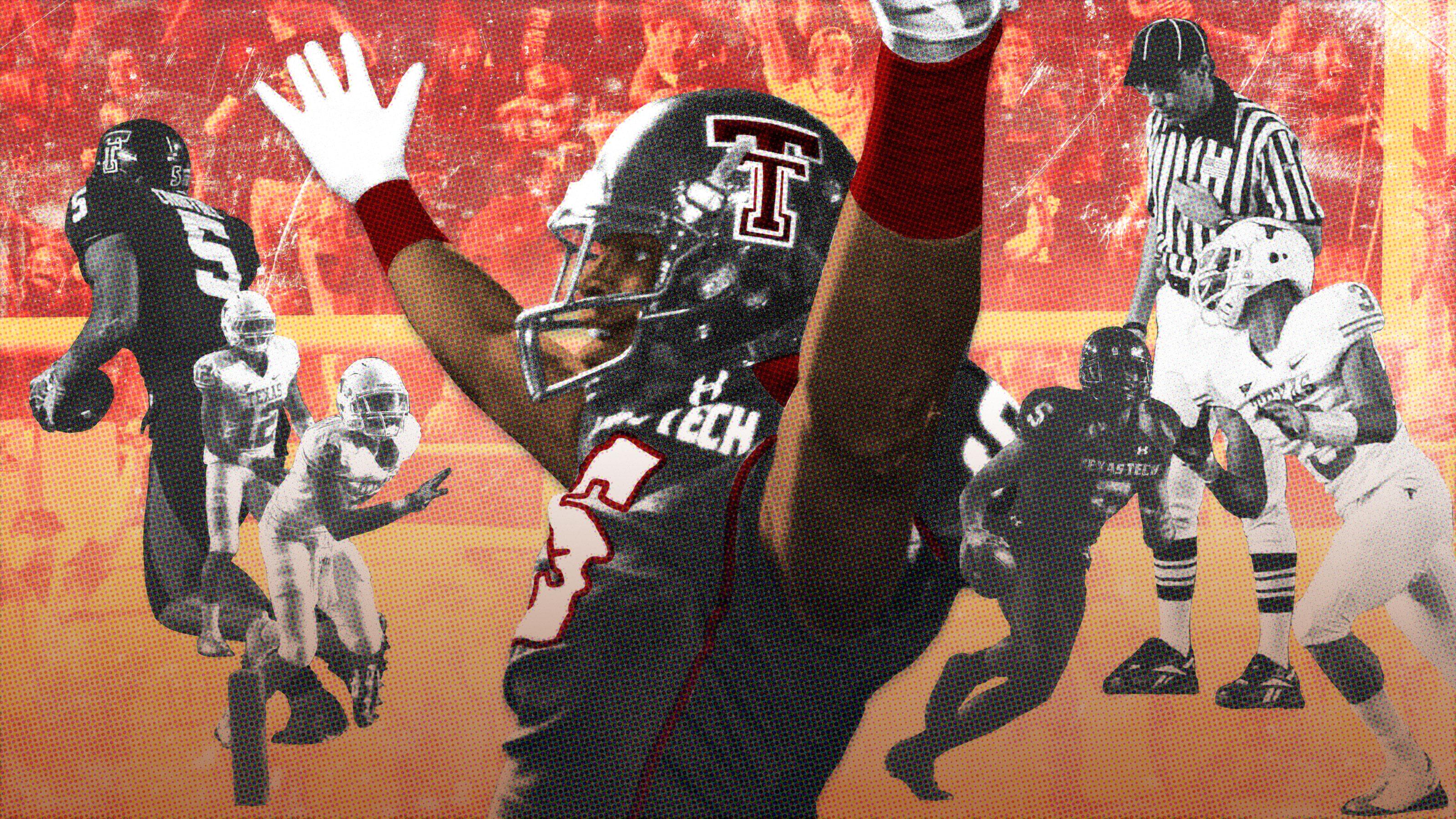Remembering the Night 10 Years Ago When Michael Crabtree and Texas Tech Broke Texas’s Heart
On November 1, 2008, the Longhorns were headed to a national championship and Colt McCoy was a Heisman front-runner. One night in Lubbock, and one catch, brought it all crashing down.It’s been 10 years, but Colt McCoy still remembers the bus ride back to the airport. He remembers the pick-six he threw to widen the deficit and how the comeback—his comeback—would have changed his career. Most of all, he remembers the catch that crashed a promising season. On November 1, 2008, McCoy led his Texas Longhorns into Lubbock to face a red-hot Texas Tech team. The matchup was the biggest in Texas Tech’s history, pitting an undefeated, top-ranked Texas against high-flying and seventh-ranked Texas Tech, which had taken the nation by storm with its unorthodox Air Raid offense and eccentric head coach, Mike Leach.
On that night, Red Raiders receiver Michael Crabtree secured the defining win in what would go down as Texas Tech’s most successful season, breaking the hearts of thousands of Texas fans in the process. To this day, Red Raiders who played that night are asked about their showdown with the Longhorns. Leach said someone will bring up the game weekly, sometimes more often if it’s during the season.
Graham Harrell, Texas Tech’s quarterback from 2005 to 2008, said he re-lives the game daily. “Pretty much anytime, especially if I run into a random Texas fan, or you meet someone for the first time, that’s the first thing that gets brought up,” said Harrell, now the offensive coordinator at North Texas.
These days, every Longhorns win of dubious significance comes with a pronouncement declaring them “back.” What they are said to be returning to is the period of dominance coinciding with the game against the Red Raiders in 2008, when they were among the preeminent teams in the nation. Texas won at least 10 games every season from 2001 to 2009. In 2004, Texas won the Rose Bowl. In 2005, it took the national championship. Vince Young’s dominant run gave way to Colt McCoy, who would, as far as anyone was concerned, give way to the next golden boy with a rocket arm and an affable Lone Star twang.
Texas Tech was, comparatively, a minnow. Whether in the Southwest Conference or the Big 12, it was never quite a basement dweller, but never good enough to be considered among the elite. The Red Raiders had toiled in mediocrity for the majority of their history. And though they were in the midst of a renaissance under Leach, they hadn’t held a single-digit ranking in more than 30 years, and had beat the Longhorns only once since he’d been named head coach in 2000. The tide was turning heading into 2008, as Leach had found the perfect pairing for his Air Raid offense in Harrell and Crabtree. Harrell was a four-star quarterback from just outside Dallas who’d gotten offers from Georgia and Wisconsin. He had thought about committing to Texas, but decided a career in Lubbock was right for him. Crabtree was a two-sport star who was recruited by Bob Knight to join the Red Raiders’ basketball team. He had interest from other schools to play football, but not in the way he’d hoped.
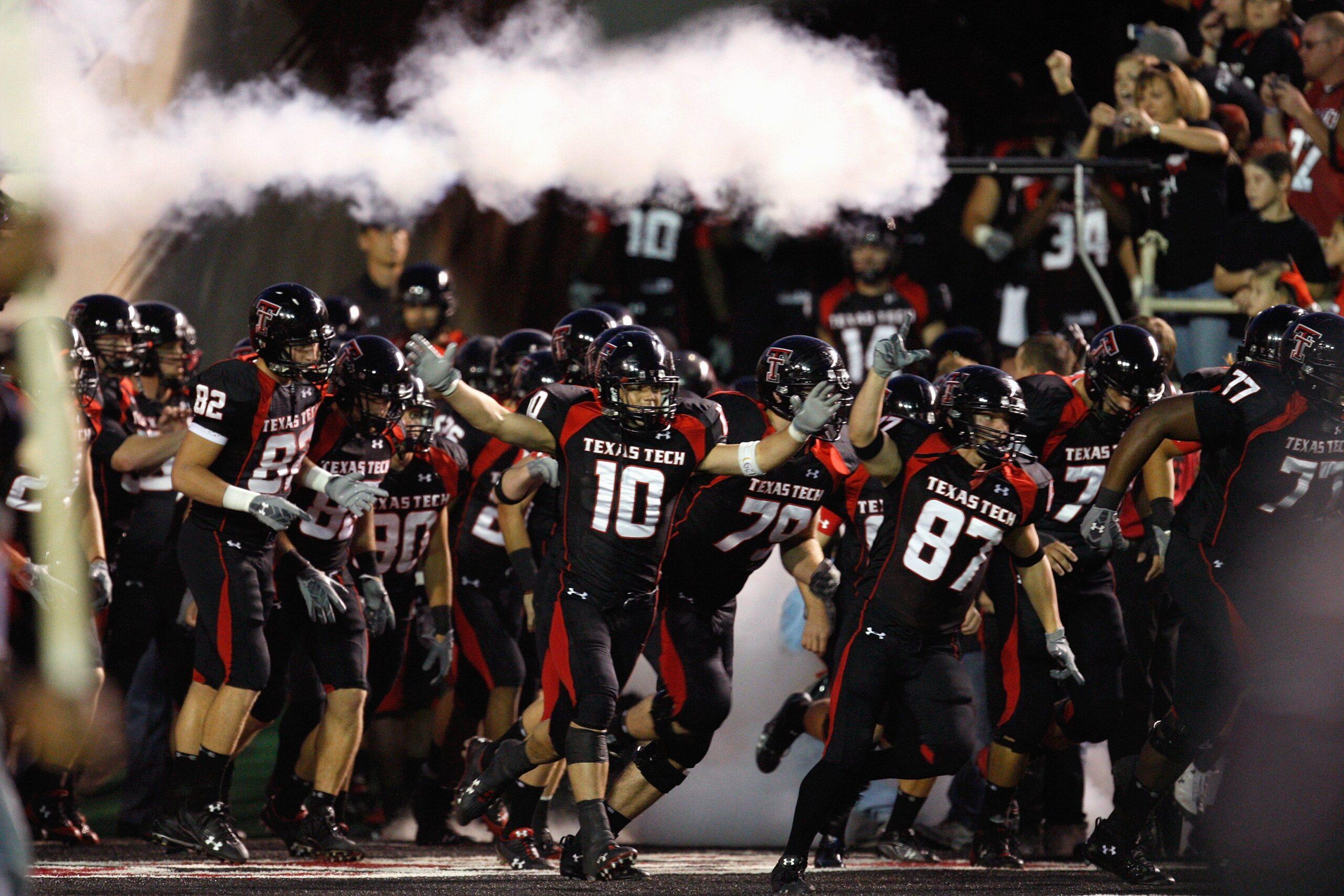
The game was played during the era of the Bowl Championship Series, which while a step up from the Bowl Alliance that preceded it in terms of fairness, still essentially reserved access to the elite games for name-brand programs. Today, it’s UCF that complains about being denied a fair shake at the national championship game in the College Football Playoff system. In 2008, it was the BCS that was perceived to disadvantage teams like Texas Tech. A visit from a juggernaut like the Longhorns, and the cachet earned from that win, would go a long way in proving that an outsider like Tech deserved a seat at the table with the rest of the sport’s elite. The stakes were high on that November night. The nation’s eyes were fixed on Lubbock, Texas, and at the center of it all was Crabtree.
Breaking into the party
The fall of 2008 was an exciting time to be in Lubbock. The Red Raiders entered the season ranked 12th in the polls following a nine-win season. The connection forged between Harrell and Crabtree had given fans the purest look into what Leach’s Air Raid offense could do. In 2007, Harrell logged the second-most-successful passing season of all time, picking up 5,705 yards through the air to go with 48 touchdowns. Crabtree, the recipient of just over a quarter of Harrell’s throws, had 1,962 receiving yards—the third most of any wideout in the sport’s history—to go along with a whopping 22 touchdowns. The chemistry between quarterback and receiver was evident in a 59-43 loss to Texas in November 2007, in which Crabtree caught nine passes for 195 yards and two scores. The next fall, they built on that link. The Red Raiders won their first eight games, averaging 48 points per contest, including a 63-21 drubbing of no. 19 Kansas. Game 9 was a visit from no. 1 Texas. McCoy and the Longhorns had been through the gantlet, beating Sam Bradford’s no. 1 Oklahoma, Chase Daniel’s no. 11 Missouri, and Dez Bryant’s no. 7 Oklahoma State in consecutive weeks en route to an 8-0 record of their own. The only thing standing between Texas and a near-guaranteed trip to the National Championship game was an evening in Lubbock.
“They had some mojo out there in West Texas, where teams did seem to play a little bit differently. … Just kind of out of character,” Texas defensive back Blake Gideon said. “Teams that would be hot that knocked off one or two teams would go through the High Plains and they’d be a shell of themselves.”
The game was something of a homecoming for McCoy, who’d been raised in West Texas, and knew the contest would be played before many high school classmates. Texas was banged up after running through a murderer’s row of opponents, and prepared for pandemonium as they traveled to Texas Tech. But they couldn’t have anticipated what the crowd of 56,333 had in store for them that evening.
Pregame: Ten thousand fans, and a bus ride into hell
Around 4 p.m.—three hours before kickoff—Texas exited the team bus and walked into the stadium. As they marched through the tunnel and onto the field, they were struck. Not figuratively. No, they were literally struck, as a packed crowd of fans began lofting trash at them.
“We get off the bus and we walk into the stadium and the stadium’s full. There’s a blackout crowd. The student section is, like, throwing junk at us as we’re walking across the field,” McCoy remembers.
The diehards weren’t just students, either. Mack Brown remembers an instructor with a penchant for rowdiness.
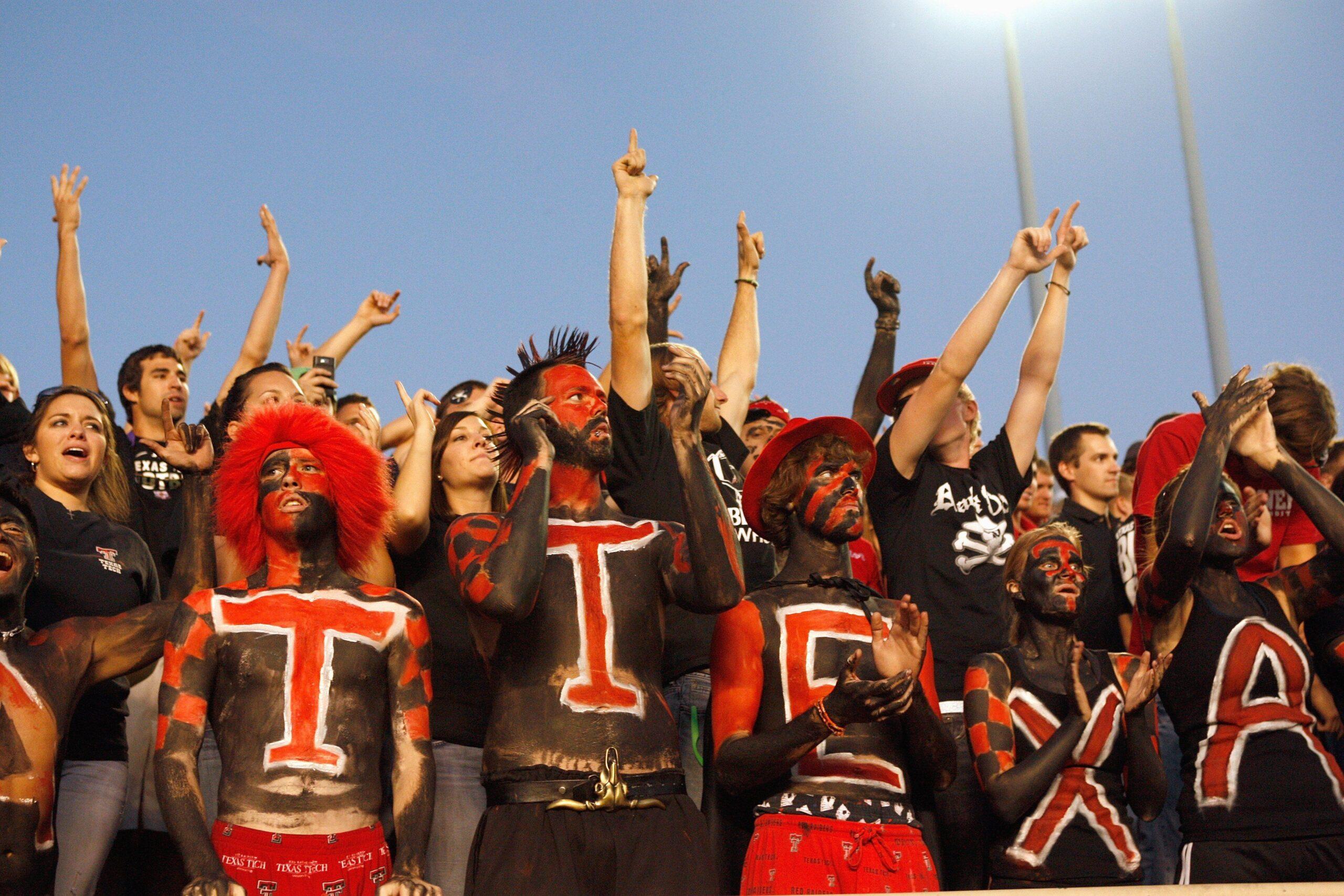
“[There was] a business professor that always painted his face black and red. He’d scream at the kids as they were coming in,” Brown said. “That’s the first time we’d ever seen a faculty member scream at the other team.”
Across campus, fans were buzzing. When ESPN announced that College Gameday was coming to Lubbock for the first time, it was only right that they gathered their belongings, left their dorms, and made a beeline for the stadium. Entrance on game day was first come first serve, so they lined up on Sunday, six days before kickoff.
They had some mojo out there in West Texas, where teams did seem to play a little bit differently.Blake Gideon, Texas defensive back
“Like, over 10,000 students were camping,” said former Texas Tech slot receiver Eric Morris. “Tents went all the way around our stadium that week. … I think Coach Leach had ordered pizza for all of [them].”
All through the week, whenever the Red Raiders filed into the stadium for practice, fans lined up to cheer them as they made the trip from the football facility to the field, traveling a path lined with lawn chairs and empty beer cans.
“Mike Leach always talks about Woodstock and Flora-Bama and crazy party places,” Morris said. “So he really jived with that. … [It was] something that I think he had a lot of fun with.”
Texas Tech 5, Texas 0 (6:47 1Q): Game begins with a safety and a cameo from a future president of the United States
That energy carried over into the start of the game. After Texas Tech punted on its first drive, the Longhorns took over from their own 2. What happened next set the tone for the rest of the half.
On their very first play of the night, Texas handed the ball to running back Chris Ogbonnaya, who was forced backward into the end zone for a safety. Just like that, Texas was down, 2-0, and forced to punt. With good field position, the Red Raiders marched toward the goal line, reaching the Texas 12 before the drive sputtered. From there, it was up to a walk-on kicker nicknamed “Lynnwood” by his teammates.
Two months earlier, Matt Williams had stepped onto Texas Tech’s field for the first time. The transfer student had been selected to compete in a fan contest during the Red Raiders’ matchup with UMass. The premise was simple: sink a 30-yard field goal and win free rent at the Lynnwood Townhomes near campus. That’s exactly what Williams did. Leach was so impressed, he had an equipment manager track Williams down. Within a few weeks, he was the starting placekicker for one of the best football teams in the country. Though he ended up playing for Texas Tech for three seasons, he was never able to collect on the free housing he won.
“He went out there, made the field goal, got on the football team, then got screwed out of his deal because of NCAA eligibility,” Leach said. “He never got to collect on it because he ended up playing.”
If Williams was nervous attempting his first field goal in front of a record crowd, he didn’t show it, launching the ball through the uprights from 29 yards to give Tech a 5-0 lead.
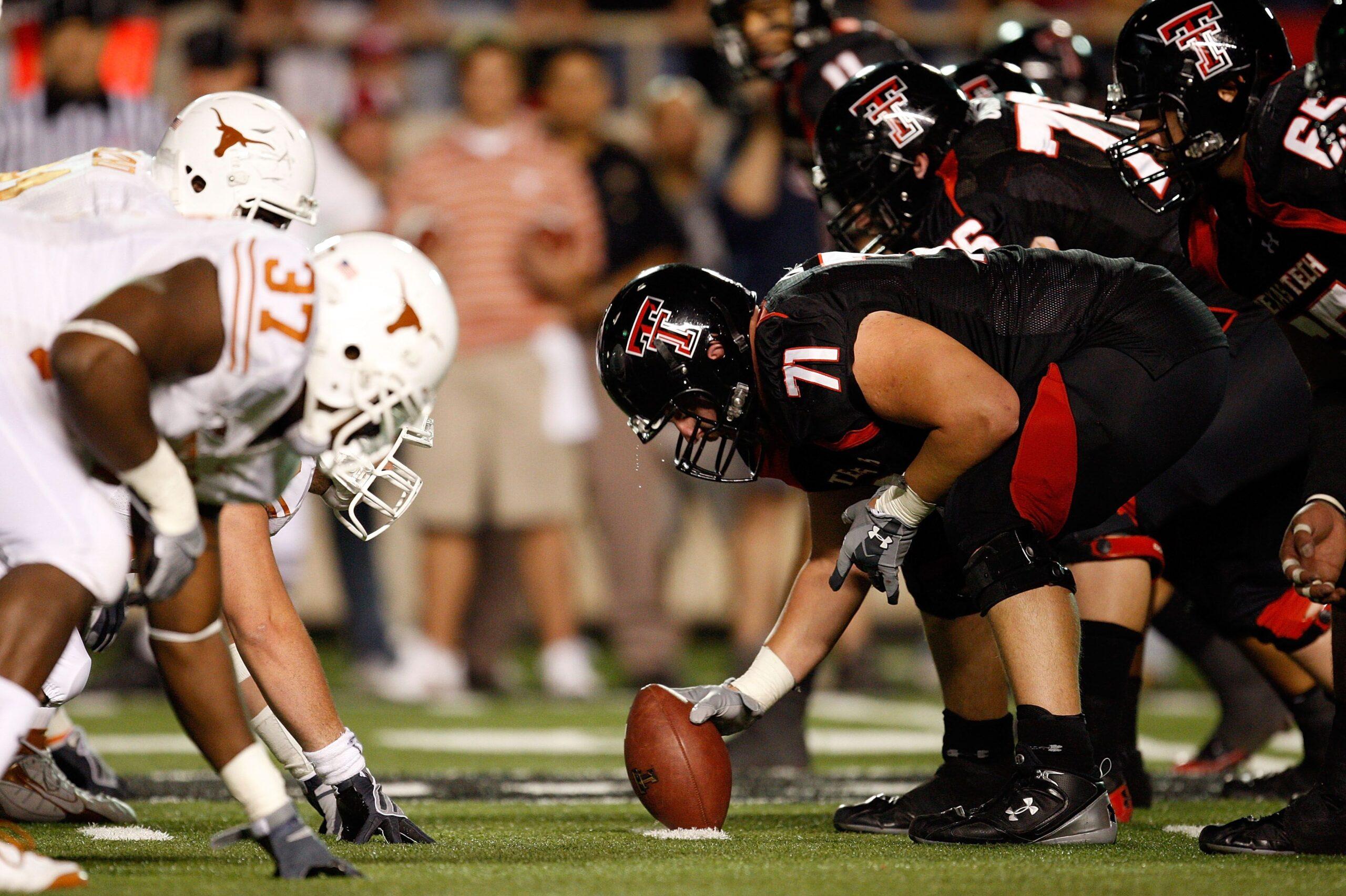
The emergence of a walk-on in one of the biggest games of the year was strange, but somehow not even the most surprising moment of the first half. As Texas prepared for what would ultimately be a futile drive, the broadcast cut away from the field for a video message from one of Leach’s best friends, Donald Trump.
“Mike you’re a friend of mine,” Trump said. “You’re a great coach. Don’t do anything different. Just do whatever you’ve been doing because whatever it is, it works. You’re an amazing guy. Motivate those players. You may very well come out with a victory.”
According to Brent Musburger on the game broadcast, the duo met when, on a visit to New York City, Leach and his family paid an unannounced visit to Trump Tower. The two hit it off, and a short while later, Trump reached out. He called Leach two days before the Texas game, and stayed in touch, calling the coach as recently as September 2017, when Leach’s current team, Washington State, upset USC.
Texas’s struggles continued throughout the first half. By midway through the second quarter, the Red Raiders held a 19-0 advantage. After a Crabtree fumble and a trio of field goals, Tech’s lead was narrowed to 22-6. But even with Texas’s deficit reduced to just two scores, there was no fooling anyone. The rout was on.
Halftime: 22-6: Colt starts the comeback
Whatever adjustments McCoy made heading into the second half, they seemed to work. In the first, he said, he was “a little shaky” getting the ball out of his hands thanks to the raucous crowd. In the second, he settled in. Some of that change can be credited to his receiver Jordan Shipley, whose punt return for a touchdown just minutes into the third quarter cut the Longhorns’ deficit to 22-13 and gave them the momentum boost they were desperately looking for. It wouldn’t last long.
Everyone was out of their seats, they were tearing bleachers apart. I mean, they thought they were going to walk away with it at that point.Colt McCoy, Texas quarterback
Even without star defensive lineman Brian Orakpo, who exited the game early in the third quarter with a knee injury, Texas’s defense looked refreshed as they forced their foes into a punt from near midfield. Across the stadium, fans could feel the game slipping. With seven and a half minutes remaining in the third quarter, McCoy lined up from his own 7 and dropped back into his own end zone for a pass. He looked left before launching the ball toward his receiver, only to be crestfallen when Texas Tech defensive back Daniel Charbonnet jumped the route and swiped the pass for a pick-six. The momentum the Longhorns had built quickly vanished, and armed with a 28-13 lead, the Red Raiders faithful began to celebrate.
“You talk about a stadium going crazy? That place was going ballistic,” McCoy said. “Everyone was out of their seats, they were tearing bleachers apart. I mean, they thought they were going to walk away with it at that point.”
Frazzled but not dejected, McCoy walked back to the sideline and told his teammates they’d have another chance. After a punt by each team, McCoy made good on his promise, guiding the Longhorns on a 58-yard drive that ended with a 37-yard touchdown pass to Malcolm Williams. A failed two-point conversion left them down 29-19 entering the fourth quarter, but a sense of fear floated over the packed crowd.
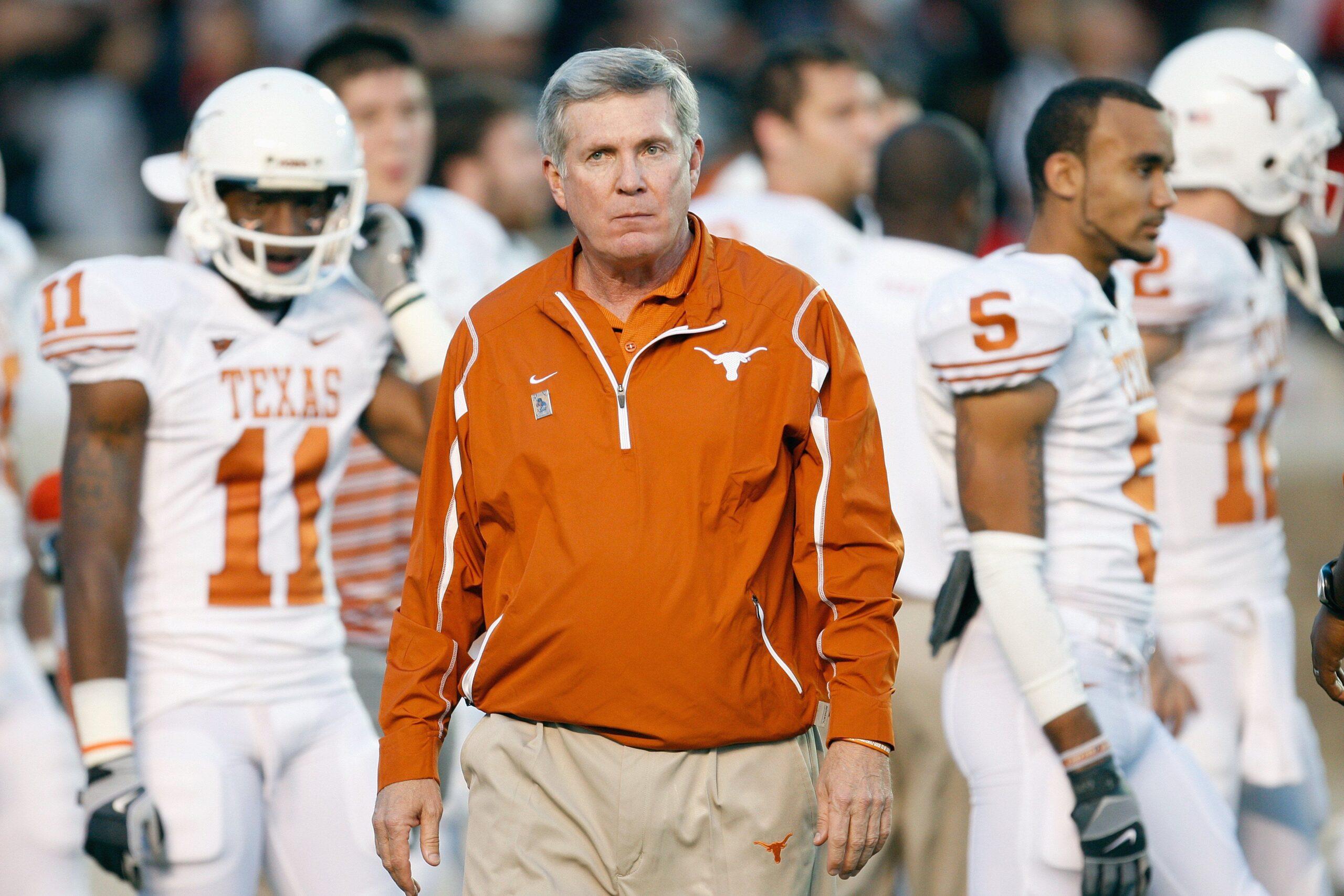
Harrell began dissecting the Texas secondary, moving 46 yards on his first two attempts, eventually reaching the Longhorns 9-yard line, where he was sacked for a loss of 16 on third down. The Red Raiders sent out Williams to line up a career-long 42-yard field goal attempt, which would have given Tech a 13-point lead with 11 minutes remaining. But Texas jumped the snap perfectly and blocked the kick. The comeback was on. On the very next play, McCoy took advantage of a mismatch he’d seen on the outside all night. The Texas Tech defensive backs had been jumping on routes, pressing instead of sitting back. So McCoy went to his coaches and voiced what he knew: Texas had to stretch the field. He called for max protection and a double move for Williams on the left hash.
“I got on headphones and I was like, ‘Coach … we gotta get down to field.’” McCoy said. “When we called the play I knew everything was right … I knew he was going to jump it.”
McCoy was right. Brent Nickerson, a junior defensive back, fell for Williams’s hesitation move. The advantage was all the wide receiver needed. A fraction of a second later, he was going 91 yards for the score. Texas Tech’s once seemingly insurmountable lead had been reduced to a three-point advantage.
Texas Tech, 29, Texas 26 (11:00 4Q): The Red Raiders can’t slam the door
The Red Raiders began pushing down the field, burning as much time as they could along the way. With six minutes left and a chance to put the game out of reach, Harrell found Crabtree completely unmarked, only to watch the ball sail incomplete. But a questionable offensive pass interference call — on a slight Crabtree push-off that sent Texas defensive back Curtis Brown into the dirt — moved the Red Raiders back to the Longhorns 25.
“To this day, Michael Crabtree has never touched that DB,” Leach said.
Harrell still contends the team should’ve put away the game on that drive.
“That was just the most bogus call I’ve ever seen. … We get the most bogus pass interference call in the history of sports to back us out of field goal range,” Harrell said. “I’m sure the Big 12 called down to the referees and said keep these guys in the game.”
After three incompletions, including an overthrown pass that bounced off of Earl Thomas’s chest, Texas Tech was forced to try a field goal, this time turning toward Donnie Carona, their kickoff man. Unlike Williams’s previous attempt, this 42-yarder sailed straight through the uprights. With just about five and a half minutes to play, Texas trailed, 32-26. McCoy gathered his offense with the clock working against him, and 80 yards to paydirt. His first pass fell incomplete. His second picked up 5 yards. With his season in the balance, he found Brandon Collins for 14 yards to keep the chains moving.
“Every championship team has a defining moment in their season. For both of these teams, this is that moment,” Kirk Herbstreit bellowed on the broadcast. “This is Texas. This is Colt McCoy. This is what we expected to see this entire night.”
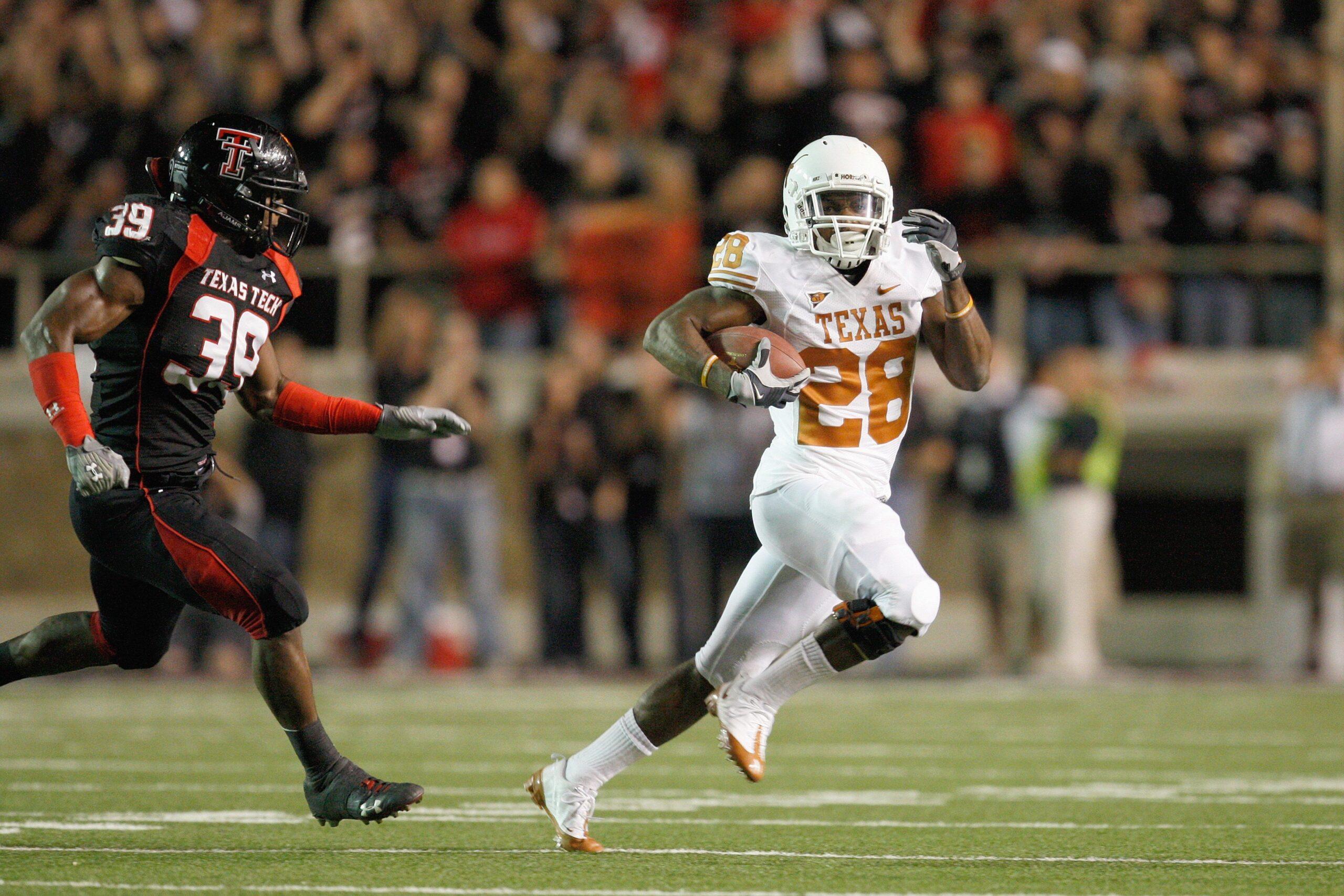
Two more plays, two more first downs. It was almost as if McCoy and his teammates shared a brain, each moving in perfect alignment with each other as they marched down the field. With 3:40 left on the clock, the Longhorns snapped the ball from the 30. McCoy scrambled twice in the next four plays and passed once, dragging Texas down to the 5-yard line. The Heisman hopeful couldn’t miss, but all throughout the drive, he kept his eye on the clock. The Longhorns were picking up yards with relative ease—and that was the problem.
“We go 80 yards, we march right down the field. I feel like I’m in pretty good rhythm, pretty good command of what’s going on,” McCoy said. “I’m also consciously aware of the clock … understanding that time to Texas Tech means nothing.”
A Foswhitt Whittaker rush on first down picked up a yard, and more importantly, burned another 30 seconds off the clock. On second down, Texas ran a counter for Vondrell McGee. And for better or for worse, he crossed the plane. The Longhorns took a 33-32 lead after the extra point, but they weren’t out of the woods yet. The clock still read 1:29.
“When he bounced through and scored a touchdown, I mean, we were all going crazy. We went 80 yards in five and a half minutes,” McCoy said. “It’s inside the 10-yard line, and you know you gotta score to win. You just don’t want to score too fast.”
And while being able to juice the clock may have benefited the Longhorns, both Brown and McCoy said there was never a discussion about whether they would purposely not score.
“People were very critical at the time that we didn’t run the clock down to another 30, 40 seconds. But it hadn’t been an easy night. There weren’t any guarantees we were even gonna score,” Brown said. “We were going to let the clock run down after the play if we hadn’t scored that time. I remember we’d already told the guys, call a timeout, let the clock run down, get it low as you can. Then, of course, like everything else that didn’t happen well at the end of that game, we scored.”
It was Texas’s first lead of the game. But McCoy knew there might not be much time to enjoy it.
“I see 1:29 left, and I just think to myself, ‘I may have just lost this game for us,’” McCoy said.
Texas 33, Texas Tech 32 (1:29 4Q): The Catch
The Air Raid is designed, in many ways, to mask flaws. One-on-one matchups are a nightmare if your team isn’t as skilled as your opponent, so by letting players operate in space, a coach can neutralize talent disparities. This was how Leach shepherded his teams to success year after year. And it made sense; his players were often good, but never supremely talented. That is, until Michael Crabtree came along.
Blessed with arguably the best wide receiver in the country, and coming off an electric passing season, Leach wanted to take advantage. Starting with spring ball and all the way into the fall, every sixth practice was a four verticals day. It was the simplest call in the playbook. There were no wild routes or laterals. It was just four verticals on every snap for the full afternoon.
“We had whole days where that was the only football play we ran in the whole course of the practice,” Morris said. “Just four verts the whole entire practice. Which some people would say that is a waste of time and crazy. But we were always really good at it.”
Not only were the Red Raiders expected to attempt Hail Marys on every down, but Leach would get upset with his signal-caller after each missed connection.
“At times it was frustrating because Coach Leach would get on me pretty good because we’re not completing every pass. And it’s like, well, we’re running four verticals every play. You’re not gonna complete every play when you throw four verticals,” Harrell said. “Our receivers hated it because they ran four verticals every play. I didn’t mind it.”
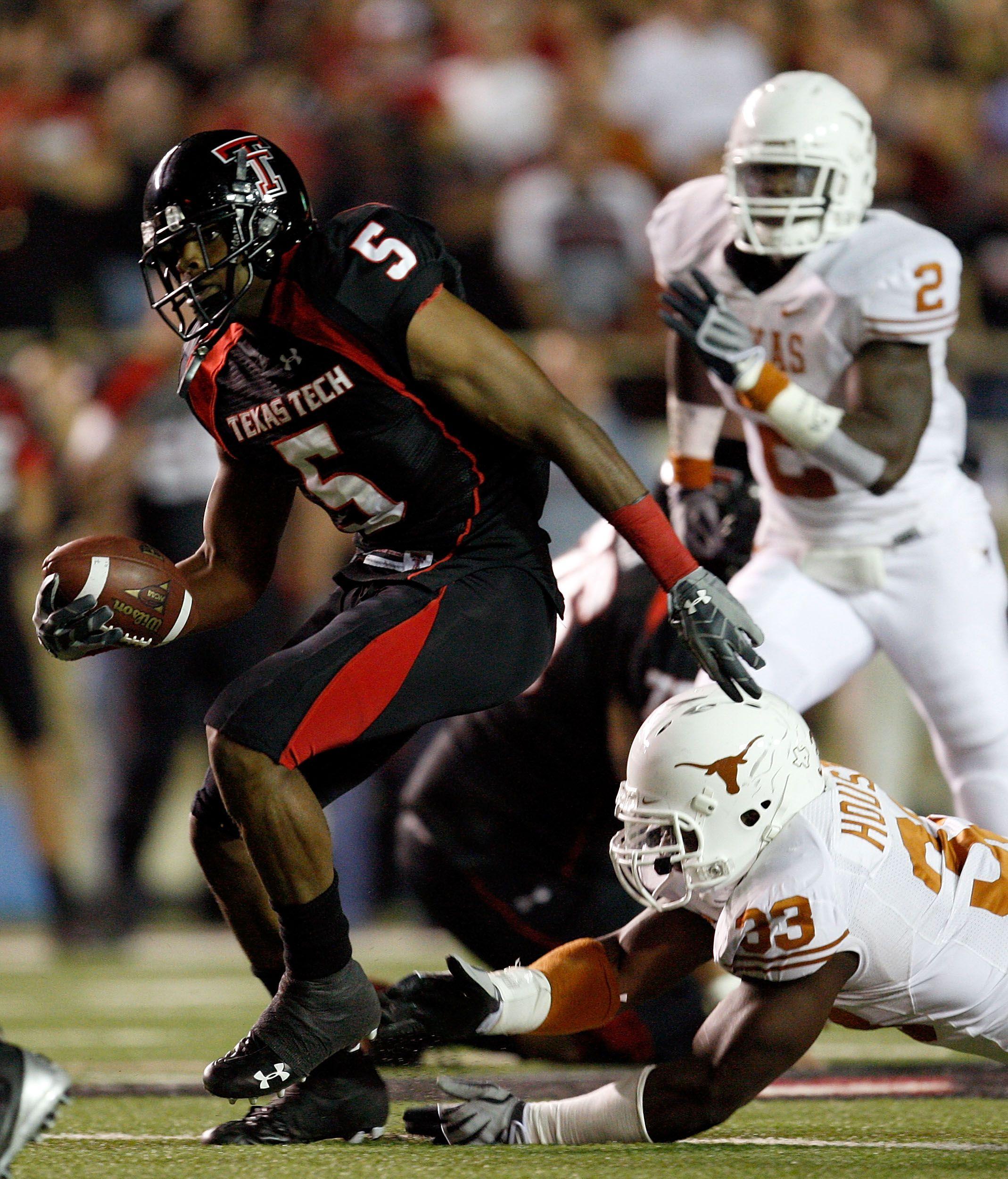
There was not a call in the playbook that Texas Tech knew better. And with the game on the line, there might not have been a better play to have memorized. As Harrell readied his offense for one final push, he let his mind wander to a shared thought. They left us too much time.
“That was a mistake on their part. … As soon as they scored with a minute 30 left, I’m obviously thinking, ‘Man, they left us too much time,’” Harrell said. “All we gotta do is run our offense and we’ll move it down the field and go win this game.”
As soon as they scored with a minute 30 left, I’m obviously thinking, ‘Man, they left us too much time. All we gotta do is run our offense and we’ll move it down the field and go win this game.Graham Harrell, Texas Tech quarterback
On the first play of the drive, Harrell hit running back Baron Batch just short of the sticks. Then it was a screen to receiver Detron Lewis that almost ended in calamity, if not for a smart move by the back, who split two Longhorns defenders and dove for the first down to push the Red Raiders into Texas territory with 30 seconds left. On the next play, Lewis picked up another first down, gaining 11 yards on a back-shoulder catch to bring Texas Tech closer to field goal range. Then Edward Britton gained 10 yards to bring the ball to rest at the 28-yard line with 15 ticks left.
With one timeout in hand, Texas Tech could seemingly relax. A field goal attempt from here would be the longest of the evening, but would surely be makeable. A short run toward the center of the field or a simple crossing route would turn a possible game-winning kick into a likely one. The crowning win to cap the greatest season in program history would be complete. Leach would go down as a hero, as would Harrell and Crabtree and Batch, and every other Red Raider who walked out in front of a record crowd at Jones AT&T Stadium.
All that was standing between them and a sure victory was a play, and a kick. And that’s when it all nearly came crumbling down. On first-and-10 from the 28, Harrell received the snap and then idled in the pocket, looking for someone to come to his aid. Only, no one did. And his safety net began to collapse. Harrell, scrambling, reached the line of scrimmage and darted a pass to Britton in the flat. But a miscommunication left Britton sputtering. He batted the ball up into the air, and seemingly into the hands of Longhorns defensive back Gideon, who plucked it out of the sky and pinned it between his legs. A lead, squandered. A comeback wasted. The arc of the universe, bending, as it always did, toward Austin.
But while the announcers on the broadcast screamed “interception,” those on the field saw a different result. The ball had fallen through Gideon’s arms and bounced off the turf before nestling between his thighs.
“I could’ve won it right there, could’ve won it for the team and the game would be over,” Gideon said. “The ball bounced off of him and I remember seeing the ball go up—I saw it the whole time. The ball didn’t go in the lights or anything. I wasn’t blinded by the lights or anything. I remember for a split second thinking that I needed to lay out for it, judging the flight of the ball, or if I need to just cradle it right there and just fall down.”
Britton—one of the fastest players on the roster—thought that Harrell would scramble to pick up the yardage, and that he should turn and try to block for him. Harrell, aware of his own limitations and eager to put the ball in his playmaker’s hands, tossed the ball forward. He followed it in the air the whole time, watching it drop onto the earth before coming to rest between Gideon’s legs.
“I saw it hit the ground right in front of me, go right through his arms and hit the ground,” Harrell said. “And so I never thought, ‘Oh, game over.’”
Blessed with a second chance, the Red Raiders lined up at the 28-yard line once more and called the same play they had on the previous snap. Two wide receivers lined up on each side of Harrell, and another playmaker with him in the backfield. It was the play they’d practiced more than any other: four verticals. With eight seconds left, Harrell took the snap, dropped three steps from the shotgun, set his feet, and lofted a pass down the right sideline toward his favorite target. Crabtree reached, pulling the ball in at the 6-yard line over a lunging Curtis Brown, with Earl Thomas hanging close behind. Crabtree turned, Brown still draped around his shoulders, and, to Harrell’s surprise, shrugged the defender off before streaking down the touchline and into the end zone.
Touchdown, Texas Tech. Harrell to Crabtree for the win. Could it have been anyone else? The catch was Crabtree’s 10th of the game, and the most important of his career. Everyone watching the Red Raiders could have guessed the ball was going to the star receiver, and so Texas defensive coordinator Will Muschamp drew up what he thought would save the game. The Longhorns double-teamed Crabtree, hoping to force Harrell to sling the ball over the middle to Eric Morris. Ideally, the Longhorns would be able to contain the slot receiver and drain the remaining eight seconds off the clock.
“I thought the ball would be thrown inside against Aaron Williams in the slot on Morris, but it wasn’t,” Muschamp said. “Where we thought they’d go, we had him doubled.”
In a way, Muschamp’s gambit worked. Morris was wide open in the middle of the field. But Harrell was looking for Crabtree all the way.
“I always tell people I was wide open and Graham went ahead and threw it to the best receiver in the nation double-covered,” Morris said.
Harrell said he expected the safety, Thomas, to shift over and cover Crabtree tightly. It would be unfortunate, but he’d have to find another target. Only when the play started, Thomas tried to split the distance between the two receivers lined up on his side of the field. That guy can’t see the ball, and Crabtree can see the ball, Harrell thought. Just throw the back shoulder and Crab will make the play.
On the Texas sideline, the Longhorns stood stunned. Their dreams of a national championship were dashed, and McCoy’s Heisman was effectively lost. Muschamp said he thought Thomas and Curtis Brown figured Crabtree had stepped out of bounds. Mack Brown said Thomas told him he’d heard a whistle from the stands, and that he’d heard it too, and that explained why Thomas stopped dead in his tracks, fearing a 15-yard penalty if he hit Crabtree after the play ended. Harrell thinks otherwise.
“That’s a hundred percent excuses,” Harrell said. “It’s so loud in there, there’s no way. There could have been 10 million whistles being blown. You’re not gonna hear anything with that noise at that point.”
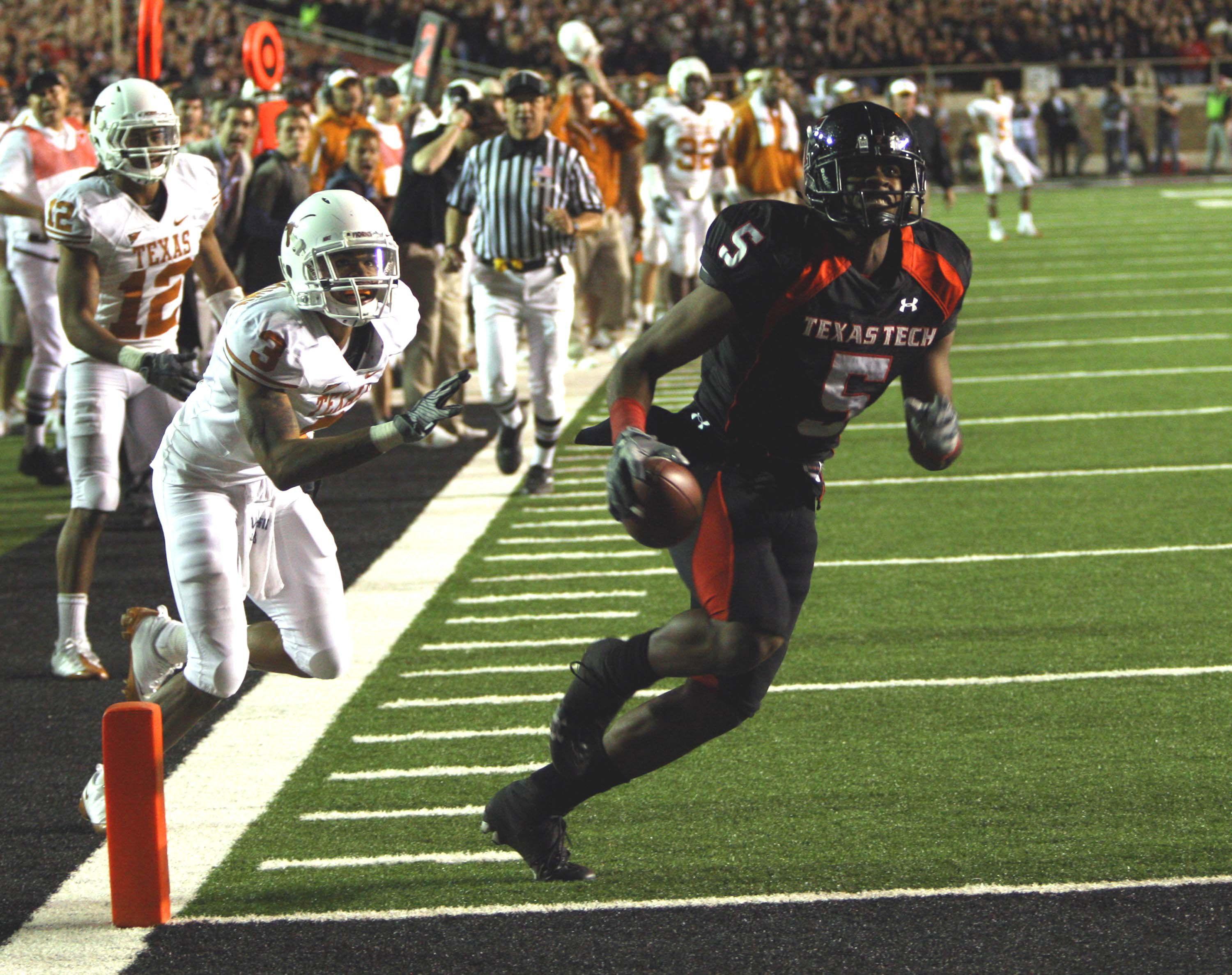
Leach similarly has no patience for the theory that Crabtree had stepped out of bounds.
“He didn’t step out at all. It’s not even close. He’s not even remotely close to stepping out. They can think whatever they want,” Leach said. “The best is when you see [ESPN’s] Chris Fowler’s mouth as Crabtree is running past, scoring. Chris Fowler’s mouth is so wide open you could stick a baseball in it.”
Crabtree told ESPN’s Lisa Salters that he’d envisioned the moment before kickoff. “I don’t wanna say nothing, but I dreamed that,” he said. “I dreamed it in my head. … It really happened.”
I don’t wanna say nothing, but I dreamed that. I dreamed it in my head. … It really happened.” —Michael Crabtree, Texas Tech wide receiver
Seconds after Crabtree cross the goal line, Red Raiders fans began flooding over the wall and onto the field, either not realizing or not caring that a single second remained on the game clock.
“If you watch it from above, [it looks] like 10 million fire ants came out,” Harrell said. “They were on the field immediately.”
The officials tried fruitlessly to shoo the fans back off the turf, not helped much at all by the Red Raiders, who were still celebrating in the end zone. When a referee announced the ruling on the field of a touchdown had been confirmed, they spilled over the walls once more, until, yet again, they were ushered up against the outer rim of the bowl.
And as fun as the celebration on the field was, it would not go unpunished. Before the extra-point attempt, Texas Tech was hit with an unsportsmanlike conduct penalty. After the kick went through the uprights, they were given a second one. The ensuing kickoff—the final play of the game—would begin from their own seven-and-a-half-yard line.
After the storm
The fans, now unable to climb the wall back into the bleachers, and penalized twice for encroaching onto the field, had no choice but to surround the touchlines, forming a human barricade around the sides. Mack Brown ran for the officials, confirming that a fair catch call would allow McCoy and the offense to return to the field, and Leach plotted how to prevent that from happening.
“This may disappoint some of the politically correct people, but I couldn’t care less. I said, ‘Well, I’m trying to find a guy that can’t field the ball very well. … Kick the ball to a fat kid,’ hoping it would go to some offensive lineman or something, and thinking he’ll bobble the ball around and try to keep it away from somebody fast,” Leach said. “So we kick it to this fat kid, and son of a gun, he fields it like a shortstop. I mean this guy looked like Ozzie Smith out there fielding this ball. He didn’t even flinch. … And then he pitched it to this skinny kid that runs just faster than hell. … That kid was almost so fast that he’s worried more about running than catching. He bobbled that thing around.”
After a few laterals, the ball finally came to rest. David had defeated Goliath. Death by ten thousand passes. The fans rushed the turf one final time, in permanent celebration. The Big 12 South would end in a three-way tie between Texas, Texas Tech, and Oklahoma, and the league turned to its fifth tiebreaker—BCS standings—to determine the winner. (Missouri won the North.) Oklahoma was ranked highest of the three teams and thus punched their ticket to the conference, and later national title, games. Looking back, that’s what upsets McCoy the most about the loss.
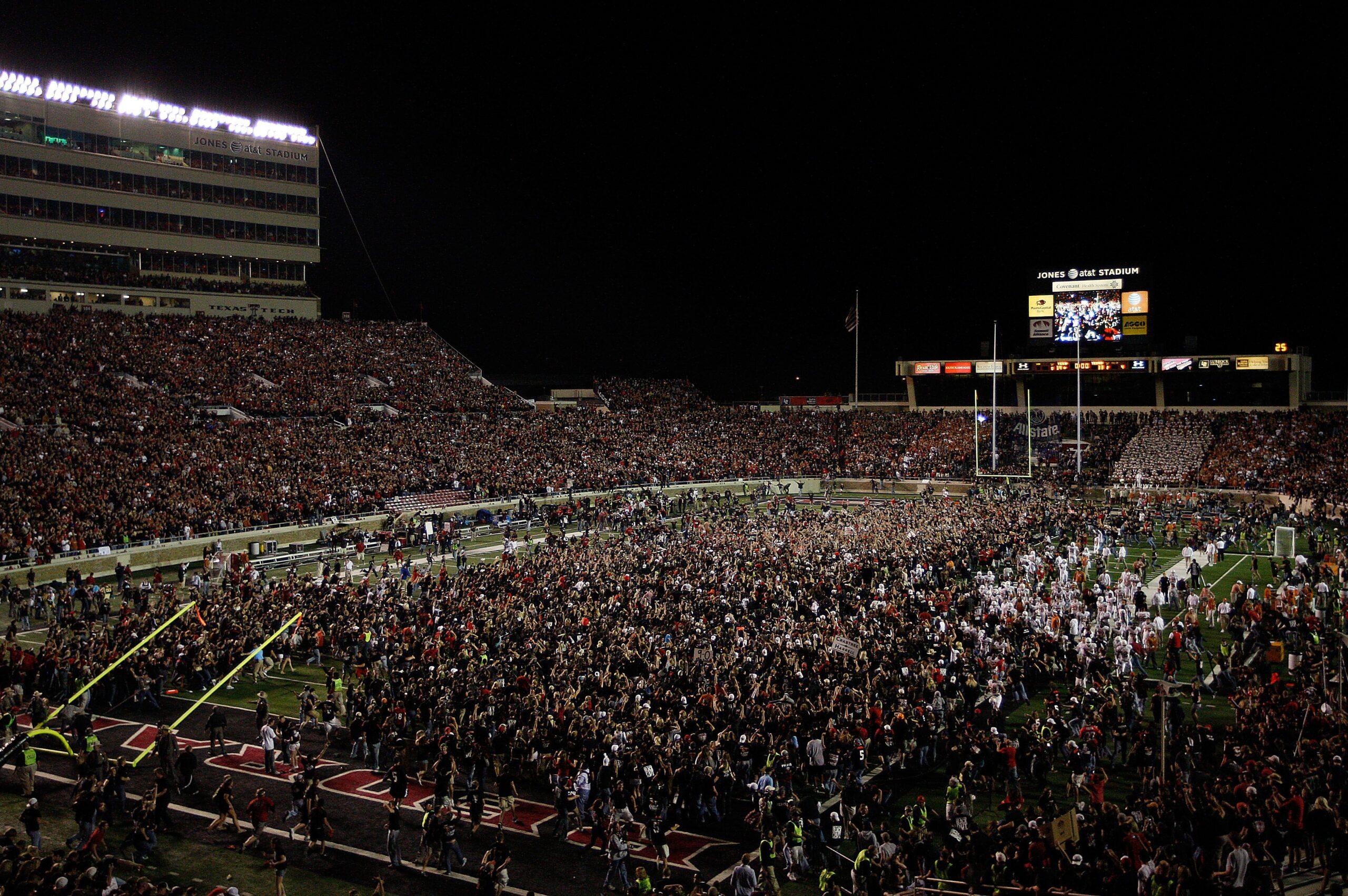
“I was probably more sick to my stomach sitting at home watching the Big 12 championship knowing that we beat both of those teams pretty handily and now they were getting to play for the Big 12 championship,” McCoy said. “And that just crushed me.”
And while McCoy was at first hesitant to say the loss sealed his fate in the Heisman voting, as both Brown and Muschamp did, he did admit that the game had an impact.
“That was probably my Heisman moment. I was the front-runner, I was playing great. I was on a very good team, a very well-coached team. And I just took our team 80 yards in five minutes to win the game. What else do you want me to do?” McCoy said of his final drive. “But the moment Crabtree catches the ball and scores, the whole world forgets about that. We probably would have won the national championship and I probably would have won the Heisman.”
As for Texas Tech, that night in Lubbock is still the high-water mark in the program’s history. College Gameday returned the next week for their win over Oklahoma State, but the Red Raiders would lose to the other half of Bedlam the following game, and that season ended with a loss in the Cotton Bowl to Ole Miss. It would be the final season for both Harrell and Crabtree. Leach was fired after an investigation into his treatment of a concussed player the next fall. He’s currently in his seventh season at Washington State. As for the Red Raiders, they’ve settled back into mediocrity in the Big 12, but they’ll always have the memories from November 1, 2008.
